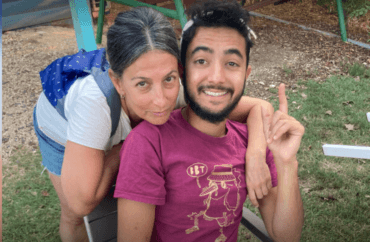The Orthodox Man Who Saved A Life With His Yarmulke
Some children dream of being teachers; some, of lawyers. But Eli Beer, an Orthodox Jew who is the founder and president of Hatzolah United, has known since he was a young boy that his mission in life was to save lives. Beer recently gave a TED Talk that gathered praise from around the world. I had the opportunity for an exclusive interview with Eli, in which he spoke about his upbringing and the powerful role that Judaism has played in his life and career.
Eli was born in Israel, the son of Orthodox Jews who had made aliyah from New York. Growing up, Eli could not escape the realities of a country with a history of conflict and terror attacks. When he was six years old, Beer was walking home from school with his brother when, right in front of their eyes, a bus exploded. He witnessed an injured man, lying on the ground calling out for help. This day inevitably etched itself into his mind, and even at the tender age of six, he knew that he would dedicate his life to saving lives.
By the age of fifteen, Eli was already beginning to take steps to actualize his dream. He enrolled in an EMT course and began volunteering in ambulances. During his volunteer experiences something became frighteningly clear to him: the time it took to get to the scene of emergencies was stopping the team from saving lives. The gridlocked traffic of Jerusalem turned a five minute trip into a twenty minute one. Being the go-getter that he was (and still is), Eli approached the manager of the ambulance company with the idea of equipping the team members with beepers, so whoever was closest to the scene could just run to it. The manager simply dismissed him as a ‘meshuganeh’ (crazy) kid.
It was this refusal that spurred Eli to begin championing a vision that is flourishing today. He went out and bought police scanners, and the very next day, he heard a call coming on the scanner: there was a seventy year old man who had been hit by a car. Eli rushed to the scene to find that the man was bleeding profusely; he used his yarmulke as a makeshift dressing with which he applied pressure and stopped the bleeding. When the ambulance arrived 15 minutes later, it was clear that Eli had saved this man’s life. (Eli was visibly wearing a yarmulke during his TED talk, and as he told this story he took it off to demonstrate how he had saved this man’s life, thereby highlighting the yarmulke. This action did not go unnoticed by the millions of people watching, and Eli was overwhelmed with the thousands of messages he received from people from all walks of life acknowledging his good deeds being done as an observant Jew.)
Despite seeing such pain and tragedy throughout his life, Eli explained to me it has not had an effect on his belief in God because there are people doing good and people doing bad and the goal is to be one of the good guys. He said that “the fact that I have the zechut (merit) to be doing what I’m doing gives me a lot of love for God because He gave me the ability to help lots of people.” Eli’s faith is a central part of his life, and it influences the way he approaches his work. He explained to me that the greatest act a person can do is “v’ahavta l’rayacha kamocha”: to love one’s fellow as they love themselves, a commandment in the Torah. This as the essence of Judaism according to Beer.
Such a strong resolve and religious beliefs have helped turn United Hatzalah into what it is today: an international organization that has saved countless people. Eli credits three main tenets of United Hatzalah for its spectacular success: dedicated volunteers who will drop what they are doing in an instant when called upon, the use of advanced technology, such as a GPS system that transfers calls to those who are closest, and perhaps most significantly – ambucycles – or motorcycle ambulances (pictured above) which Eli developed. Because of their ability to drive in between traffic or even on the sidewalk, the ambucycles can get to the scene in minutes. They provide immediate care while the ambulance is on its way, which can make the difference between life and death.
True to its name, United Hatzalah has spread throughout the world and has united Arabs and Jews within Israel towards a worthy cause. In fact, when Eli’s own father had a cardiac arrest a few years ago, one of the first volunteers on the scene was an Arab who had been in the first training course for Arabs in East Jerusalem to join Hatzolah. As Eli said to me, “It’s not about saving Jews. It’s not about saving Muslims. It’s not about saving Christians. It’s about saving people.” Indeed.
Eli also shared with me the story of one Yom Kippur when he received a call about a cardiac arrest right before ne’ilah, (the final prayer service of the day). He rushed out to the scene and saved the man’s life, whom he later found out was a non-Jew. Upon returning, Eli explained what had happened to a man at his synagogue whom he refers to as a talmid chacham (Torah scholar). The man told him, “You don’t have to do your neilah, you did your neilah. You did Hashem’s work.” These words have stuck with him ever since.
If you found this content meaningful and want to help further our mission through our Keter, Makom, and Tikun branches, please consider becoming a Change Maker today.










1 comment
Sort by
Um……could this man or this post be any more amazing?! Kiddush Hashem, B.H.!
Way to go, JITC!